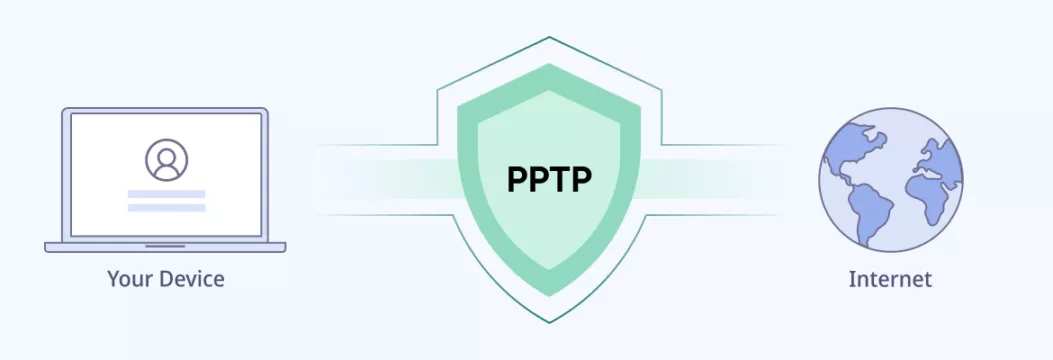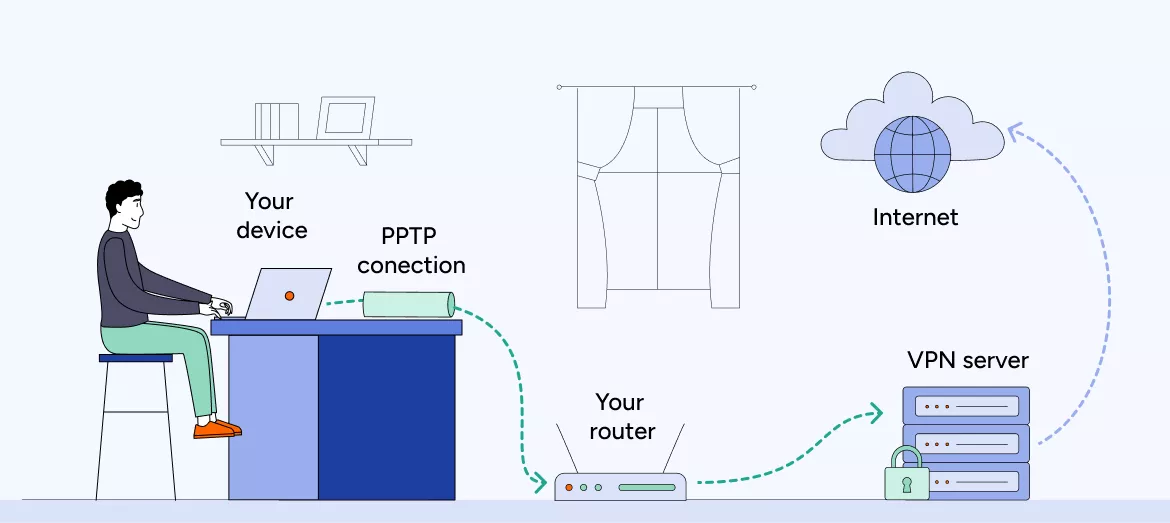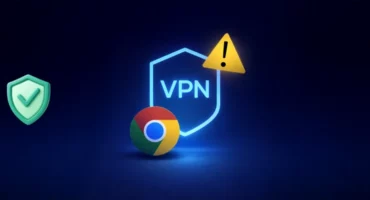What Is PPTP VPN? (And Is It Secure Enough for Your Needs?)
There are numerous virtual private network (VPN) protocols out there, but not all of them are equally stable and efficient. PPTP is one of the oldest and most well-known protocols, still used for some PPTP connections on legacy systems. Although many consider it outdated, some devices and operating systems still support PPTP. So, can this technology address modern users’ requirements, and, most importantly, meet your individual needs? Read along to answer these and other questions and learn the key details about PPTP VPN – all explained in a simple manner.

What is PPTP VPN network protocol?
Point-to-Point Tunneling Protocol (PPTP) is a technology some VPNs use to establish the connection between a device and the Internet, with transit through a remote PPTP VPN server. Simply put, when your device is connected to a VPN, your traffic runs through an encrypted tunnel before reaching its destination (a website you want to visit). This tunnel functions according to the rules set by a specific VPN protocol and is supposed to ensure private Internet access with PPTP.
In other words, the primary goal of PPTP and other VPN protocols is to receive your data, encrypt it, and move it through the web. But this protocol is rather obsolete, which makes it less secure than other options when a secure VPN protocol compared to modern choices like OpenVPN or IKEv2.
That’s because PPTP is the first VPN protocol, which was introduced by Microsoft back in 1995. Since then, many new technologies have emerged, outperforming PPTP in terms of data protection, connection stability, and encryption.
Now, let’s take a closer look at how PPTP works to understand its specifics better. There will be some tech details here – but no worries, only plain English, as promised.
How does PPTP VPN network protocol work?
As mentioned, PPTP is responsible for transmitting your data through an encrypted VPN tunnel. This tunnel lies between two points – your device and a remote server. Theoretically, it should provide reliable encryption and authentication to make your Internet journey secure and private.

But again, PPTP is based on outdated technology – PPP (Point-to-Point protocol) that uses obsolete technologies. Its authentication protocols have already experienced hacks and breaches, so users can hardly trust them with their sensitive data.
Moreover, PPTP doesn’t support modern encryption standards. Instead, it only works with MPPE (Microsoft Point-to-Point Encryption) – 128-bit encryption. It’s much more vulnerable to potential cracks and leaves a backdoor open for snoopers. At Defcon 2012, it was revealed that some simple hacking tools can easily exploit PPTP.
Another factor that makes PPTP a questionable protocol for modern needs is the PPTP Passthrough requirement.
What is PPTP Passthrough?
PPTP Passthrough allows you to overcome limitations when connected to a router. It grants you an alternative call ID that helps bypass network address translation (NAT) protocols. Basically, it means that PPTP doesn’t support NAT. In turn, most modern routers don’t have the PPTP Passthrough feature by default. As a result, you will likely face difficulties when trying to go through NAT restrictions using PPTP.
In contrast, more powerful and up-to-date VPN protocols like OpenVPN and IKEv2 have alternative features to go around NAT without requiring a router equipped with PPTP Passthrough.
Now that you know what PPTP is and how it works, let’s discuss its main advantages and disadvantages in more detail.
PPTP protocol pros and cons
Clearly, being an outdated VPN protocol, PPTP has multiple downsides compared to newer technologies. But it also comes with several benefits and may be suitable for particular use cases. Here are the main pros and cons of PPTP.
Benefits of PPTP
👍 High speeds. The lack of powerful encryption doesn’t only weaken your protection online. It also has one positive side effect – a significant increase in connection speed. Without going through a multi-layer encryption process, your data moves faster (the security issues aren’t going away, though). But anyway, PPTP is one of the fastest VPN protocols to date.
👍 Easy setup. PPTP is quite simple to set up and run. That’s one of the reasons why many businesses still opt for this protocol. It quickly establishes VPN connections across many devices, providing remote access to corporate servers.
👍 Cross-platform compatibility. PPTP works best with Windows since Microsoft was behind its creation. But a cross-platform nature makes PPTP suitable for almost any device and operating system, including Linux, Android, iOS, and macOS (but note that the latest versions of iOS and macOS no longer support PPTP VPN client apps).
Drawbacks of PPTP
👎 Weak encryption and authentication. As mentioned, PPTP encryption is outdated, as well as its authentication standards. So it’s less resistant to potential attacks and breaches. Obsolete technology behind PPTP is the main reason why many VPN services, including VeePN, don’t support it.
👎 Ineffectiveness against firewalls. PPTP doesn’t have the necessary features to overcome firewalls and other online censorship techniques (which is one of the main reasons why many users need a VPN). It relies on TCP Port 1723, which is easy to detect and block.
👎 Passthrough requirement. Again, PPTP works only with older router models, as modern ones rarely come with the PPTP Passthrough feature.
👎 Multiple vulnerabilities. According to numerous reports, NSA and other surveillance agencies have already decrypted PPTP several times.
PPTP compared to other VPN protocols
Now it’s time to compare PPTP to other popular VPN protocols. Here, we will consider the three most powerful ones supported by the most reliable VPN service providers, including VeePN: OpenVPN, IKEv2/IPsec, and WireGuard®.
PPTP vs. OpenVPN
To cut a long story short, OpenVPN is slower than PPTP, but it’s much more secure. It’s one of the most stable and reliable VPN protocols to date, making it an ideal choice for protecting sensitive data and confidential communications. OpenVPN has two versions:
- TCP (transmission control protocol) – provides consistent movement of Internet traffic.
- UDP (user datagram protocol) – ensures faster data transmission.
All in all, if you want to keep your personal information to yourself, OpenVPN is your go-to. But if faster connection speed is your main priority, consider one of the options below.
For more details, check out our detailed blog post about OpenVPN.
PPTP vs. IKEv2 IPsec
Just like with OpenVPN, IKEv2/IPsec is a bit slower – but that’s the only advantage of PPTP in this battle. Other than that, IKEv2/IPsec outperforms its older opponent in all aspects. It supports AES-256 encryption and offers advanced security. Besides, IKEv2/IPsec is an excellent choice for those who often switch from Wi-Fi to mobile data.
Want to learn more? Click here to find all you should know about the IKEv2/IPsec VPN protocol.
PPTP vs. WireGuard®
WireGuard® is the most modern and powerful VPN protocol on this list. It’s built on much shorter code to achieve faster speeds without compromising your cybersecurity. Still, PPTP may be a bit faster due to poorer encryption. But if you want to balance reliability and speed, WireGuard® is your best choice.
VPN users mostly opt for the WireGuard® protocol to stream media and play online games without connection lags and interruptions. For more information, read our recent blog post about the WireGuard® protocol.
PPTP vs. other VPN protocols: The round-up
Let’s sum up our comparison of PPTP with superior VPN protocols supported by VeePN.
| PPTP | OpenVPN | IKEv2/IPsec | WireGuard® | |
| 🛡️ Security | Vulnerable | Advanced | Advanced | Advanced |
| 🔐 Encryption | AES-128 | AES-256 | AES-256 | AES-256 |
| 📊 Stability | Average | Very high | Very high | Very high |
| ⚡ Speed | Very fast | Fast | Fast | Very fast |
| ⚙️ Setup | Easy | Easy with VPN client | Easy with VPN client | Easy with VPN client |
Want to use the most powerful VPN protocols? Try VeePN!
As you can see, PPTP is relevant only for Internet activities that don’t require a good level of protection and privacy. Meanwhile, more modern VPN protocols are perfect for any goal – from lag-free gaming and streaming to confidential communications and secure money transactions.
Want to get it all without the time-consuming setup of the secure VPN connections required for your individual needs? Give VeePN a shot! It’s a top-rated VPN service that enables you to choose from the best VPN protocols to date – OpenVPN TCP, OpenVPN UPD, IKEv2/IPsec, and WireGuard®. Just pick the most suitable one in the app’s convenient settings and enjoy your secure and private browsing experience.
Check out VeePN’s pricing plans and test whether our service works for you with a 30-day money-back guarantee.
FAQ
PPTP is a VPN protocol aimed at establishing secure connections between devices connected to the Internet. But it’s based on obsolete technology and has many security vulnerabilities. In particular, unlike more modern VPN protocols, PPTP VPN only supports AES-128, which is much weaker than advanced AES-256 encryption. Read this article to learn more.
No, these days reliable VPN services like VeePN don’t support PPTP due to its security flaws and outdated technologies behind it. Some examples of more modern and powerful VPN protocols are OpenVPN, IKEv2/IPsec, and WireGuard®. For more details, check out this article.
OpenVPN is a much more modern, stable, and secure VPN protocol than PPTP. Unlike OpenVPN, PPTP doesn’t support AES-256 encryption and has many vulnerabilities. In contrast, OpenVPN is exceptionally safe, reliable, and effective against online restrictions. The only advantage of PPTP is higher connection speed. For more information, read this article.
L2TP is more reliable and secure than PPTP. It works with additional IPsec protocol and supports AES-256 encryption. But many VPN services do not support either of these protocols. While the main drawback of PPTP is poor encryption, L2TP potentially leaves a backdoor for surveillance agencies like NSA. That’s why VeePN only supports OpenVPN, IKEv2/IPsec, and WireGuard® – the most powerful and secure VPN protocols to date.
VeePN is freedom
Download VeePN Client for All Platforms
Enjoy a smooth VPN experience anywhere, anytime. No matter the device you have — phone or laptop, tablet or router — VeePN’s next-gen data protection and ultra-fast speeds will cover all of them.
Download for PC Download for Mac IOS and Android App
IOS and Android App
Want secure browsing while reading this?
See the difference for yourself - Try VeePN PRO for 3-days for $1, no risk, no pressure.
Start My $1 TrialThen VeePN PRO 1-year plan








